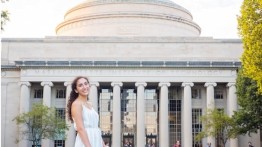Electrical Engineering Alumna Awarded Soros Fellowship
POSTED ON: April 14, 2021

Image of Aziza Almanakly EE'20
Aziza Almanakly, a 2020 Cooper Union graduate in electrical engineering, has been awarded a Paul & Daisy Soros Fellowship for New Americans, a highly prestigious prize for immigrants and first-generation Americans pursuing graduate studies. The award of $90,000 will support Almanakly’s work at MIT, where she is earning a PhD in electrical engineering and computer science.
For her PhD reseach, Almanakly is researching microwave quantum optics with superconducting quits for quantum communication under Professor William Oliver. The fellowship provides her with a stipend and covers half of all tuition and fees for two years.
Almanakly explains that the field of quantum computing is dedicated to redefining the fundamental unit of information to vastly expand computational power. Traditionally computing defines information in a static state—such as “up” or “down”. Each piece of information is called a “bit.” With quantum computing, the goal is to store information in between these static states, and each unit of information is called a “qubit.” Theoretically, this would make calculations that are intractable on classical computers possible on quantum computers.
Almanakly does not anticipate that quantum computers will replace classical computers. Instead, she believes that they will be used in very specialized fields such as medicine and network security to solve problems currently out of reach of classical computing. She mentions the doctoral work of one of her Cooper professors as an example: “Professor Mili Shah used clever numerical linear algebra analysis to model protein dynamics within limits of computing, but a quantum computer could theoretically simulate these protein dynamics without the same computational constraints, which could be pivotal for medicinal research.” At this point, she says, the field is so new that work is really focused on research and the fundamental technology, not applications just yet.
A native of Rockaway, New Jersey in Morris County, Almanakly’s parents emigrated from Syria in 1991—her father a civil engineer and her mother a pharmacist. The eldest of three children (with one brother studying electrical engineering at Cooper), she notes that the MIT fellowships office gave her workshops on handling the final round interviews for the award, working with a coach to focus on explaining her experience as a new American, as she puts it, as well as explaining the complex subject she is undertaking at MIT. At times, she finds explaining the immigrant milieu of her family more difficult to convey than her work in quantum computing. “I forget that these are situations I live with every day that might not be familiar to other people.”
She says that seeing her parents work so hard to give her more opportunities than they themselves had access to has motivated her to dedicate herself to her studies. But it’s obvious that Almanakly is also motivated by passion for her subject: she expects that quantum computing will be the central subject of her career, considering the early stages of the field. She’s also enthusiastic about teaching, having worked as a peer tutor since high school, and is considering using her doctorate to become a professor.
In the short term, she’s excited to attend the conferences for PD Soros fellows that take place in New York City, a place that is very dear to her from her days at Cooper. She will be able to learn from other fellows from a wide range of disciplines—fiction writing, economics, law, medicine, public health, among others. “I am truly humbled to join the community of wildly successful immigrants and children of immigrants that make up the PD Soros family. I always say that all my friends are engineers, but soon I will have close friends from all fields that I can connect with on the level of the new American experience.”




